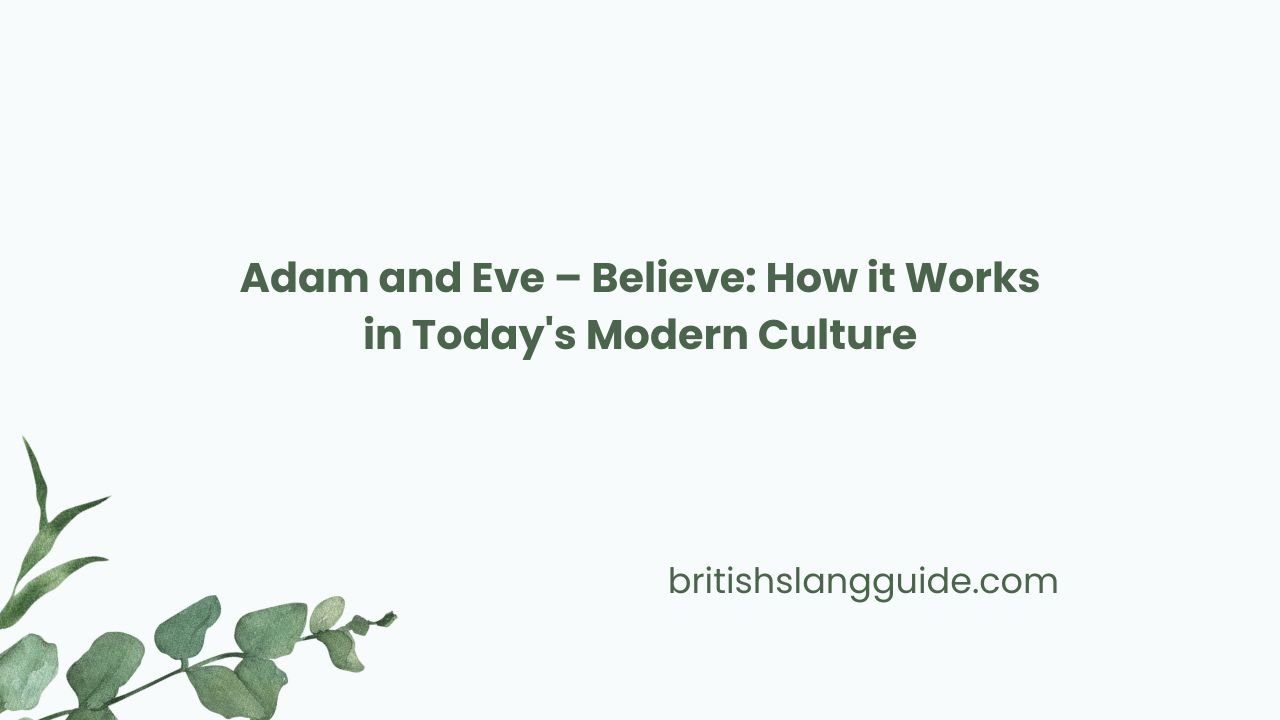| Please Wait Loading ..... |
 |

This unique style of speaking different slang started in the East in 1900. The working class of London uses slang to hide the original meaning of the terms. Among many rhyming slang “Adam and Eve” is used to say believe in a very unique way. Often the first part of rhyming slang is used to make it difficult for an outsider to understand what they are saying. So in this rhyming slang “Adam” is commonly used and “Eve” is skipped mostly.
In today's discussion, we will deeply explore the meaning, origin, and cultural influence of this rhyming slang “Adam and Eve”.
Cockney rhyming slang was created by the working class of London in the East in 1900. The working class people like delivery sellers and buyers and even in gangs, boys' groups, and criminals this linguistic part is commonly used for secret conversation to identify the outsider, etc.
The idea of creating these lines was very simple: replace existing words with quirky phrases. But as time passes these slang are used in a playful or joking way.
It is one of the most prototypical examples of a copy rhyming slang words like the real word might be believe and the slang term in this phrase is Eve. You might not hear it. Adam and Eve did it. It means I cannot believe it. This is how these work. Those who don't understand these languages do not know their original meaning. This might sound unusual, but it makes sense. Because only your first part is used mostly so you might hear it. I would not add it.
The short term of these rhyming slang even made it harder to understand if you are not familiar with them, which is the original goal of creating these, to keep conversations secret inside.
This language likely became part of East London in the 1900s. During that time these terms were used over and over and it helped people to communicate in a way that others do not understand. Using the common phrases made these easy to remember. Like in this slang “Adam and Eve” the first human beings everybody was familiar with these names. So those who are familiar with it created a rhyme that was meaningful and unforgettable.
It is important to know that these things are not written down. They are passed from generation to generation by word of mouth. So nobody can surely say that was the first person who used this slang. London culture is mostly separate through their movies and music halls, so slang like Adam and Eve quickly became popular and reached the audience. No, it becomes part of the storytelling and humour showing disbelief is a funny way.
Indeed, these are not used as much as before, but slang words like “Adam and Eve” often appear in British communication, especially in an older generation or in a specific part of East London. Because it originated from that specific area. Some examples of this slang are:
You also hear this in many shows like EastEnders and in comedy sketches, movies, especially those that are about the life of the working class of London, and historical books and novels that use local linguistic ways. Writers use such slang to add flavour to their work. They use it for adding shock, as a joke, etc. Still, slang brings a tradition to sentences.
Rhyming slang is an important part of the culture of East London. It provides knowledge about those people who create these. It also tells us about the mindset of those communities that use these in daily conversations. It also shows us how we can use language playfully and joyfully. Instead of saying the same words, we use this slang to add creativity, fun, and humour in our conversations. It helps us to create a sense of community because it is used as a code language in groups to identify people.
Today, this slang is used to reconnect themselves with history. Whenever someone uses slang in conversation, they bring a piece of the history of London. For musicians, writers, and creators, these are a tool to add realism and flavour to characters. Furthermore, for tourists and outsiders, it provides a fun look.
For saying "believe” in a funny way, “Adam and Eve” is the best phrase. It doesn’t matter that only a few people use these lines today. It still adds a surprise and a touch of history to our communication. By understanding and using this slang.
We celebrate creativity and the rich culture of the language that rhymed at the time. Slang like “Adam and Eve” made the English language more secretive and exciting.
Comments